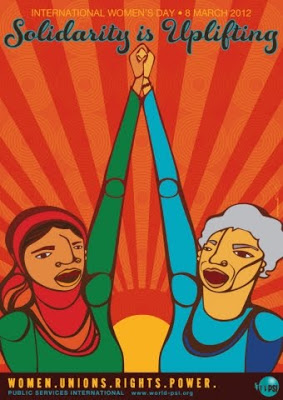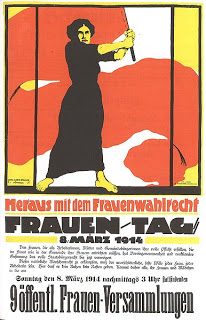Women’s rights are human rights
Besides the fact that it celebrates women in a society primarily controlled by men, it is the socialist roots of International Women’s Day that have discouraged its celebration in the United States.
By Ron Jacobs | The Rag Blog | March 7, 2012
On March 8, 1997, workers at the University of Vermont were at the beginning of a struggle to unionize. The units of the workforce that were prime for unionization (and most likely to vote in a union) were those units that maintained the buildings and grounds of the university. These units were composed of a large number of new immigrants and women.
The union we were working with was the United Electrical, Radio and Machine Workers of America or UE. This union is one of the few U.S. unions that refused to kick leftists out of the union in 1948 and is therefore not part of the AFL-CIO. We held a rally that day at the university. We chose March 8 because of its importance as International Women’s Day. It was the first that many of the workers had ever heard of this day.
Unknown to most U.S. residents, International Women’s Day has its roots in a strike by female garment workers in New York City. On March 8, 1857, these textile workers marched and picketed to demand improved working conditions, a 10-hour day, and equal rights for women. The police attacked the march.
On March 8, 1908, women textile workers marched again, recalling the 1857 march and demanding the vote, and an end to sweatshops and child labor. The police attacked this march, also.
Two years later, revolutionary Clara Zetkin urged the international socialist Second International to adopt March 8th as a holiday honoring the struggle for women’s rights. The motion passed.
Besides the fact that it celebrates women in a society primarily controlled by men, it is the socialist roots of International Women’s Day that have discouraged its celebration in the United States. After all, this is a nation that created Labor Day to prevent workers from celebrating May Day, even though that workers’ holiday was established in the United States in the late nineteenth century.
The insistent capitalism of America’s ruling classes will not so much as even acknowledge a holiday determined by the workers that celebrates something besides the domination of Wall Street and Washington. Nonetheless, both holidays continue to be celebrated in the United States, albeit not on the same scale as elsewhere.
The first that many U.S. residents alive today became aware of International Women’s Day was in the late 1960s and 1970s. Thanks to the leftist foundations of the feminist movement that developed in those years, International Women’s Day was retrieved from the dustbin of history where it had been tossed. Since those days, it has been consistently celebrated by most women’s groups, much of organized labor, and even given a mention by some elected officials.
However, like so many other movements with their current roots in the struggles of the 1960s, the women’s rights movement is much more than a single holiday. Just like people did not protest, go to jail, fight the police, and even die so that school children can celebrate Martin Luther King, Jr.’s birthday every January, neither have women and their allies fought merely to wear a ribbon or attend a celebration of International Women’s Day every March 8.
Women’s rights have always been human rights. The very fact that this day has its roots in a labor struggle proves that. Women and girls comprise much of the workforce, the student population and, in some nations, the military.
In today’s world, where the wars and economic policies of neoliberalism force millions of people to leave their homes and countries, it is the women that make up the bulk of those refugees. Given that females continue to be the primary caregivers of the human species, it becomes even clearer that their struggle is synonymous with the struggle for human rights. Yet, every day the news is full of attacks on those rights.
In the United States, the right wing and many Christian churches are conspiring to deny easy and affordable access to an essential element of health care — birth control. At the same time, budget cuts on both state and federal levels are targeting low-income children and women, leaving many of them without essential needs like food, shelter, and health care. These budget cuts are the direct result of polices that cut taxes for the rich, fund the war industry at ever greater cost, and attach more and more riders on the tax burdens of working people.
Meanwhile, unemployment maintains a relatively constant level of several million capable workers and real wages continue to sink. In other countries in the western neoliberal zone, like Greece, Spain, and Portugal, the situation is even direr.
Meanwhile, most women in countries that are part of what economists call the developing world are in even worse straits. Many of them have never lived in anything other than a refugee camp. Education is something not even considered for their male children much less for themselves or the girls in their families.
Tribal and ethnic wars that are exacerbated by the neoliberal economic crisis bring death and illness without warning. Other wars brought on by Washington and Wall Street’s perceived need for hegemony create their own havoc and death. Religious fanatics whose similarities with their kinsmen in the United States and the Vatican outweigh their differences do their best to insure women remain subjugated to their medieval belief systems.
The list continues. It is apparent that the need for a women’s movement as represented by those textile workers who took to the streets of Manhattan over a hundred years ago exists as much as it ever did. From Manhattan to Mumbai, from Beijing to Bagdad, the struggle for women’s rights and lives is the struggle for human rights and lives.
[Rag Blog contributor Ron Jacobs is the author of The Way The Wind Blew: A History of the Weather Underground. He recently released a collection of essays and musings titled Tripping Through the American Night. His latest novel, The Co-Conspirator’s Tale, is published by Fomite. His first novel, Short Order Frame Up, is published by Mainstay Press. Ron Jacobs can be reached at ronj1955@gmail.com. Find more articles by Ron Jacobs on The Rag Blog.]
Also see “Fierce Women March in San Antonio,” by Alice Embree / The Rag Blog / March 5, 2012




















Ron Jacobs is spreading a long discredited myth here. The story about International Women’s Day having its origins in an 1857 strike in NYC is a myth. There was no such strike by women’s garment workers in NYC in 1857. Even Wikipedia notes that this is a myth that was created in 20th century France and has no real historical basis.